Business and Corporation Law Assignment - Case Analysis
VerifiedAdded on 2021/06/15
|10
|2308
|38
AI Summary
Contribute Materials
Your contribution can guide someone’s learning journey. Share your
documents today.
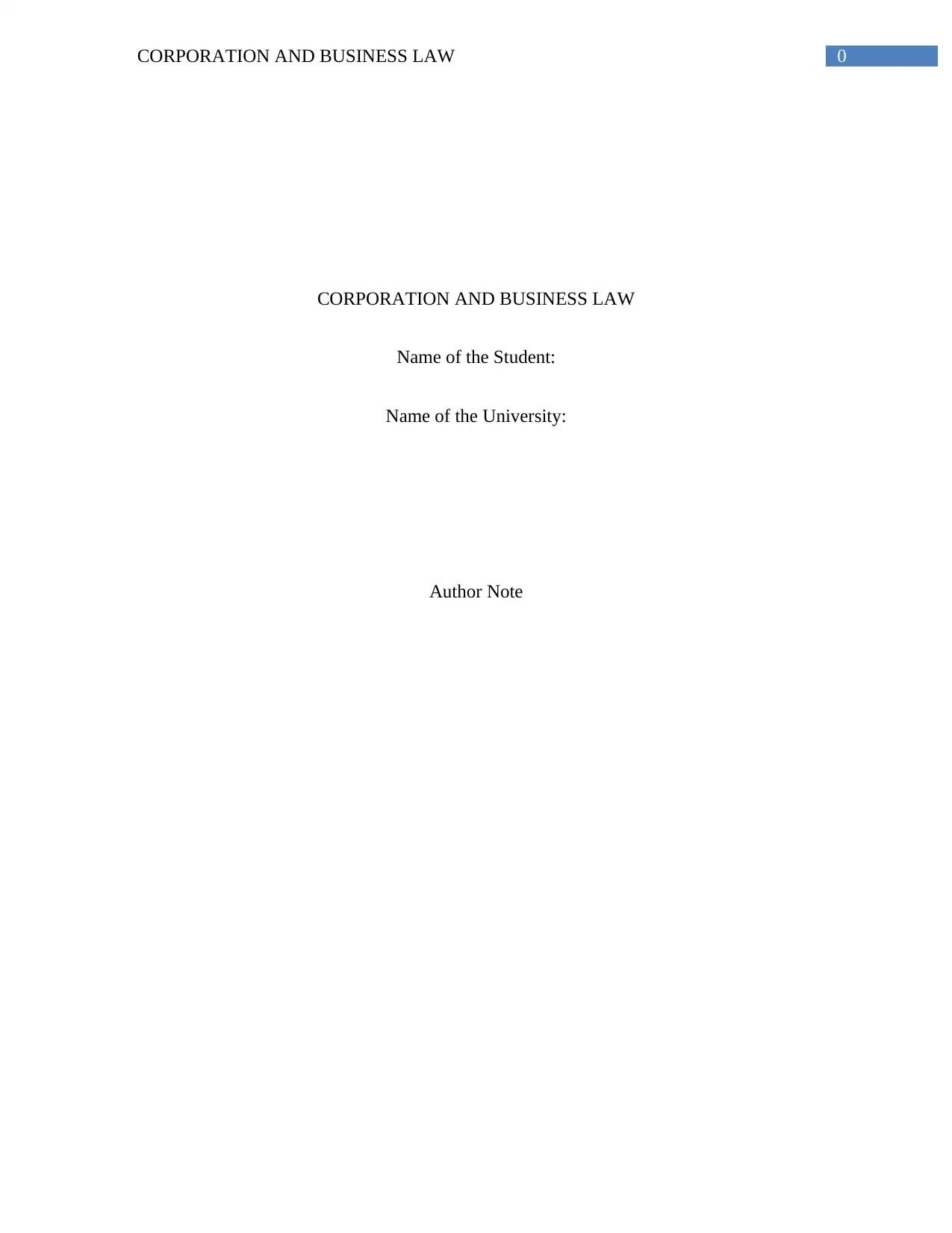
0CORPORATION AND BUSINESS LAW
CORPORATION AND BUSINESS LAW
Name of the Student:
Name of the University:
Author Note
CORPORATION AND BUSINESS LAW
Name of the Student:
Name of the University:
Author Note
Secure Best Marks with AI Grader
Need help grading? Try our AI Grader for instant feedback on your assignments.
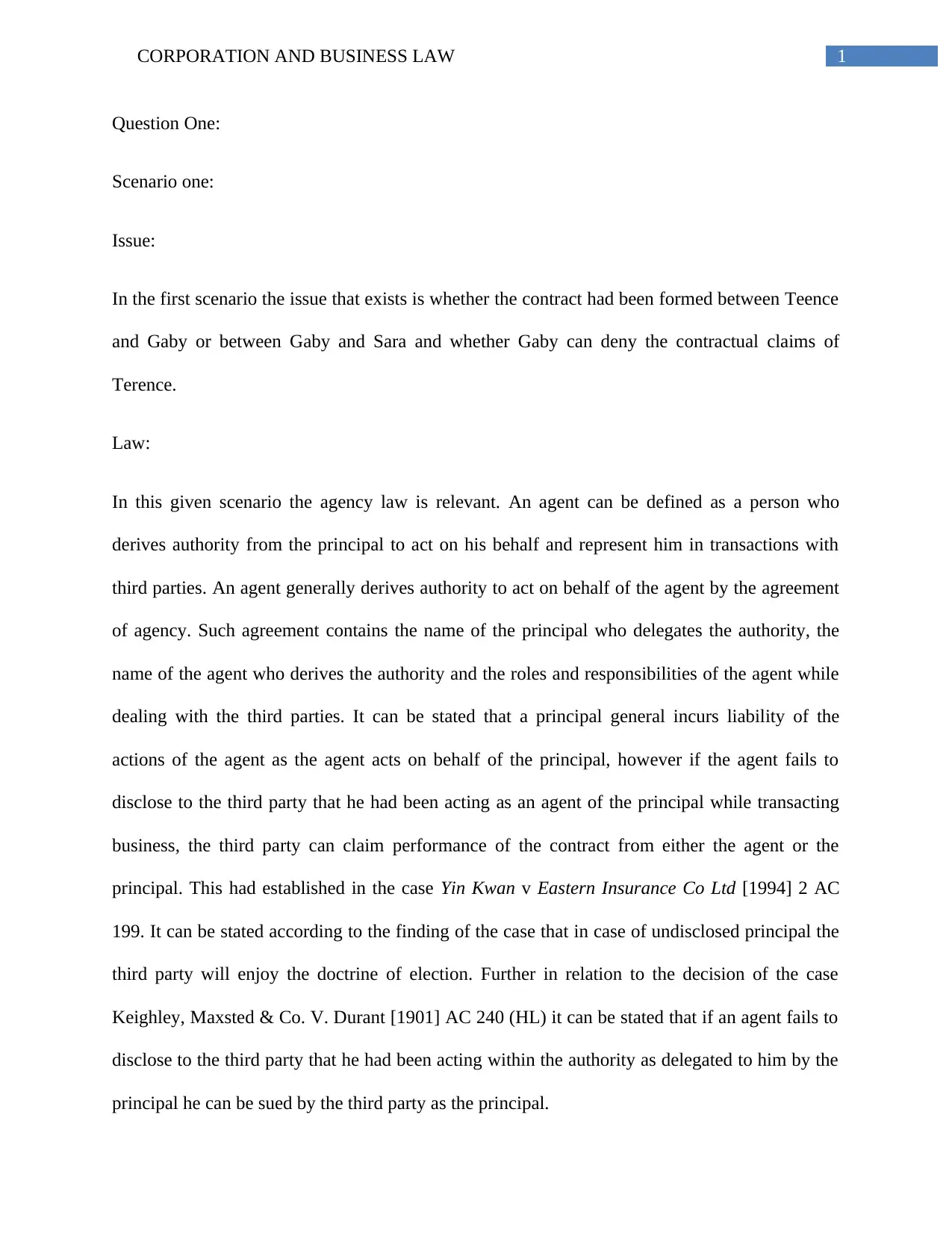
1CORPORATION AND BUSINESS LAW
Question One:
Scenario one:
Issue:
In the first scenario the issue that exists is whether the contract had been formed between Teence
and Gaby or between Gaby and Sara and whether Gaby can deny the contractual claims of
Terence.
Law:
In this given scenario the agency law is relevant. An agent can be defined as a person who
derives authority from the principal to act on his behalf and represent him in transactions with
third parties. An agent generally derives authority to act on behalf of the agent by the agreement
of agency. Such agreement contains the name of the principal who delegates the authority, the
name of the agent who derives the authority and the roles and responsibilities of the agent while
dealing with the third parties. It can be stated that a principal general incurs liability of the
actions of the agent as the agent acts on behalf of the principal, however if the agent fails to
disclose to the third party that he had been acting as an agent of the principal while transacting
business, the third party can claim performance of the contract from either the agent or the
principal. This had established in the case Yin Kwan v Eastern Insurance Co Ltd [1994] 2 AC
199. It can be stated according to the finding of the case that in case of undisclosed principal the
third party will enjoy the doctrine of election. Further in relation to the decision of the case
Keighley, Maxsted & Co. V. Durant [1901] AC 240 (HL) it can be stated that if an agent fails to
disclose to the third party that he had been acting within the authority as delegated to him by the
principal he can be sued by the third party as the principal.
Question One:
Scenario one:
Issue:
In the first scenario the issue that exists is whether the contract had been formed between Teence
and Gaby or between Gaby and Sara and whether Gaby can deny the contractual claims of
Terence.
Law:
In this given scenario the agency law is relevant. An agent can be defined as a person who
derives authority from the principal to act on his behalf and represent him in transactions with
third parties. An agent generally derives authority to act on behalf of the agent by the agreement
of agency. Such agreement contains the name of the principal who delegates the authority, the
name of the agent who derives the authority and the roles and responsibilities of the agent while
dealing with the third parties. It can be stated that a principal general incurs liability of the
actions of the agent as the agent acts on behalf of the principal, however if the agent fails to
disclose to the third party that he had been acting as an agent of the principal while transacting
business, the third party can claim performance of the contract from either the agent or the
principal. This had established in the case Yin Kwan v Eastern Insurance Co Ltd [1994] 2 AC
199. It can be stated according to the finding of the case that in case of undisclosed principal the
third party will enjoy the doctrine of election. Further in relation to the decision of the case
Keighley, Maxsted & Co. V. Durant [1901] AC 240 (HL) it can be stated that if an agent fails to
disclose to the third party that he had been acting within the authority as delegated to him by the
principal he can be sued by the third party as the principal.
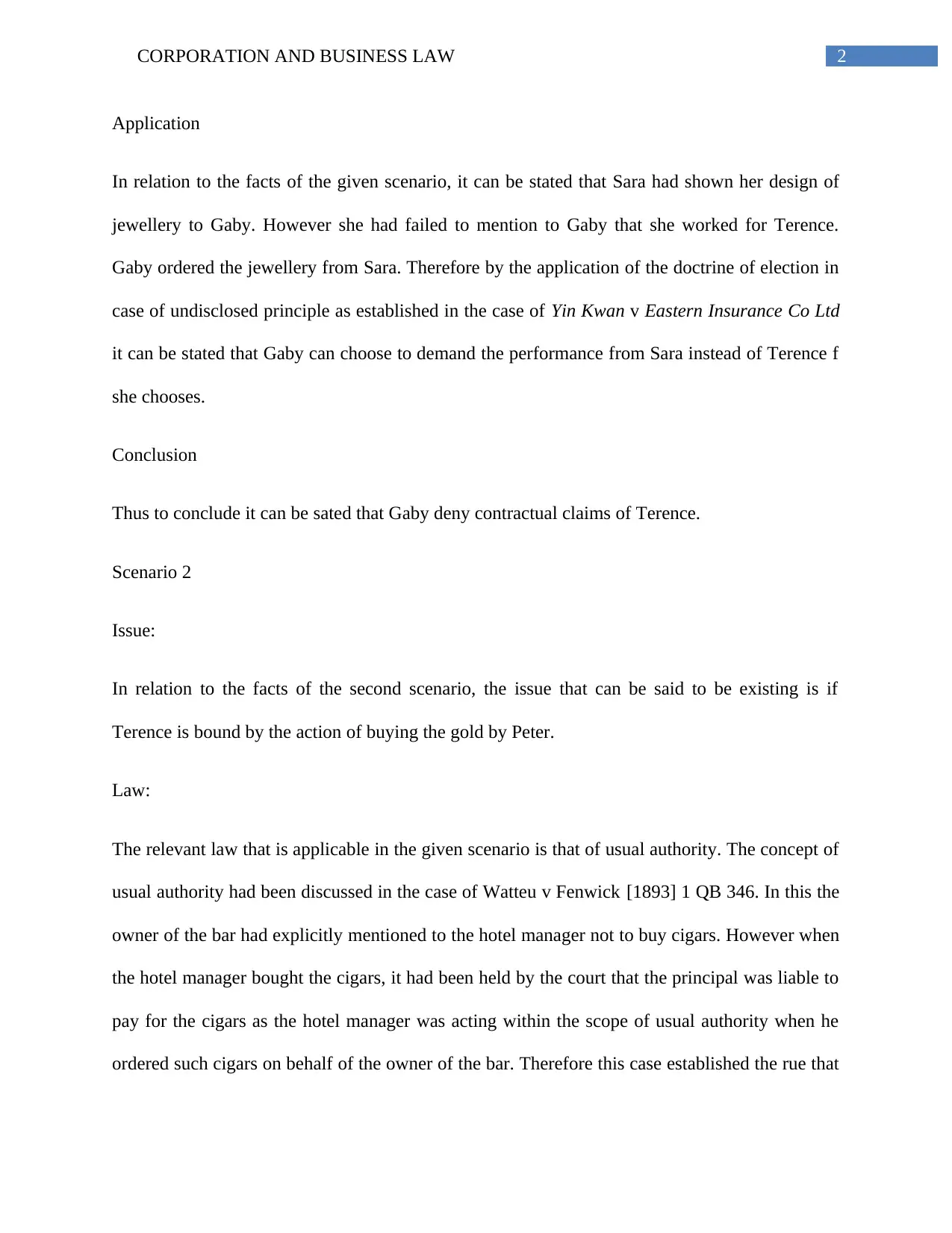
2CORPORATION AND BUSINESS LAW
Application
In relation to the facts of the given scenario, it can be stated that Sara had shown her design of
jewellery to Gaby. However she had failed to mention to Gaby that she worked for Terence.
Gaby ordered the jewellery from Sara. Therefore by the application of the doctrine of election in
case of undisclosed principle as established in the case of Yin Kwan v Eastern Insurance Co Ltd
it can be stated that Gaby can choose to demand the performance from Sara instead of Terence f
she chooses.
Conclusion
Thus to conclude it can be sated that Gaby deny contractual claims of Terence.
Scenario 2
Issue:
In relation to the facts of the second scenario, the issue that can be said to be existing is if
Terence is bound by the action of buying the gold by Peter.
Law:
The relevant law that is applicable in the given scenario is that of usual authority. The concept of
usual authority had been discussed in the case of Watteu v Fenwick [1893] 1 QB 346. In this the
owner of the bar had explicitly mentioned to the hotel manager not to buy cigars. However when
the hotel manager bought the cigars, it had been held by the court that the principal was liable to
pay for the cigars as the hotel manager was acting within the scope of usual authority when he
ordered such cigars on behalf of the owner of the bar. Therefore this case established the rue that
Application
In relation to the facts of the given scenario, it can be stated that Sara had shown her design of
jewellery to Gaby. However she had failed to mention to Gaby that she worked for Terence.
Gaby ordered the jewellery from Sara. Therefore by the application of the doctrine of election in
case of undisclosed principle as established in the case of Yin Kwan v Eastern Insurance Co Ltd
it can be stated that Gaby can choose to demand the performance from Sara instead of Terence f
she chooses.
Conclusion
Thus to conclude it can be sated that Gaby deny contractual claims of Terence.
Scenario 2
Issue:
In relation to the facts of the second scenario, the issue that can be said to be existing is if
Terence is bound by the action of buying the gold by Peter.
Law:
The relevant law that is applicable in the given scenario is that of usual authority. The concept of
usual authority had been discussed in the case of Watteu v Fenwick [1893] 1 QB 346. In this the
owner of the bar had explicitly mentioned to the hotel manager not to buy cigars. However when
the hotel manager bought the cigars, it had been held by the court that the principal was liable to
pay for the cigars as the hotel manager was acting within the scope of usual authority when he
ordered such cigars on behalf of the owner of the bar. Therefore this case established the rue that
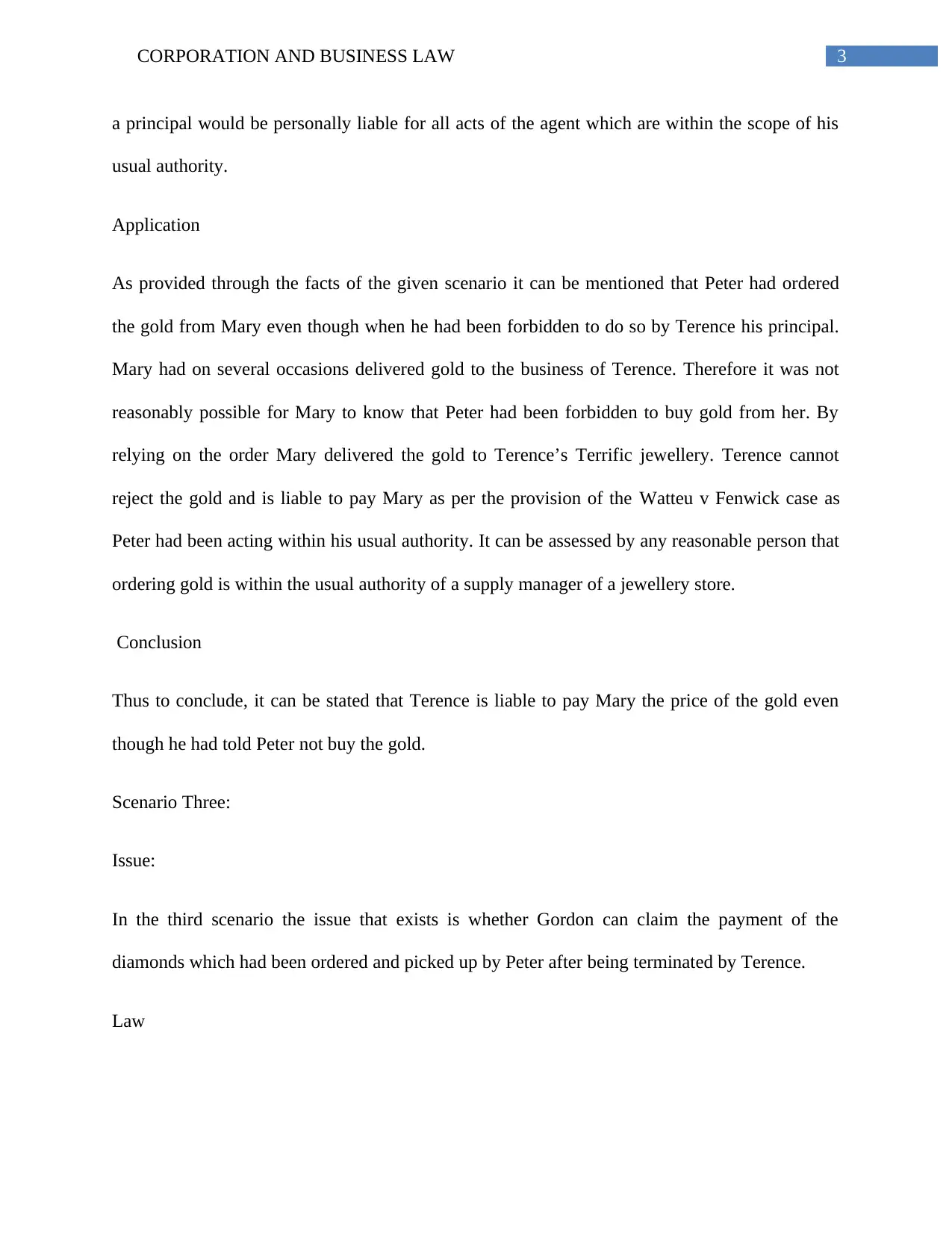
3CORPORATION AND BUSINESS LAW
a principal would be personally liable for all acts of the agent which are within the scope of his
usual authority.
Application
As provided through the facts of the given scenario it can be mentioned that Peter had ordered
the gold from Mary even though when he had been forbidden to do so by Terence his principal.
Mary had on several occasions delivered gold to the business of Terence. Therefore it was not
reasonably possible for Mary to know that Peter had been forbidden to buy gold from her. By
relying on the order Mary delivered the gold to Terence’s Terrific jewellery. Terence cannot
reject the gold and is liable to pay Mary as per the provision of the Watteu v Fenwick case as
Peter had been acting within his usual authority. It can be assessed by any reasonable person that
ordering gold is within the usual authority of a supply manager of a jewellery store.
Conclusion
Thus to conclude, it can be stated that Terence is liable to pay Mary the price of the gold even
though he had told Peter not buy the gold.
Scenario Three:
Issue:
In the third scenario the issue that exists is whether Gordon can claim the payment of the
diamonds which had been ordered and picked up by Peter after being terminated by Terence.
Law
a principal would be personally liable for all acts of the agent which are within the scope of his
usual authority.
Application
As provided through the facts of the given scenario it can be mentioned that Peter had ordered
the gold from Mary even though when he had been forbidden to do so by Terence his principal.
Mary had on several occasions delivered gold to the business of Terence. Therefore it was not
reasonably possible for Mary to know that Peter had been forbidden to buy gold from her. By
relying on the order Mary delivered the gold to Terence’s Terrific jewellery. Terence cannot
reject the gold and is liable to pay Mary as per the provision of the Watteu v Fenwick case as
Peter had been acting within his usual authority. It can be assessed by any reasonable person that
ordering gold is within the usual authority of a supply manager of a jewellery store.
Conclusion
Thus to conclude, it can be stated that Terence is liable to pay Mary the price of the gold even
though he had told Peter not buy the gold.
Scenario Three:
Issue:
In the third scenario the issue that exists is whether Gordon can claim the payment of the
diamonds which had been ordered and picked up by Peter after being terminated by Terence.
Law
Secure Best Marks with AI Grader
Need help grading? Try our AI Grader for instant feedback on your assignments.
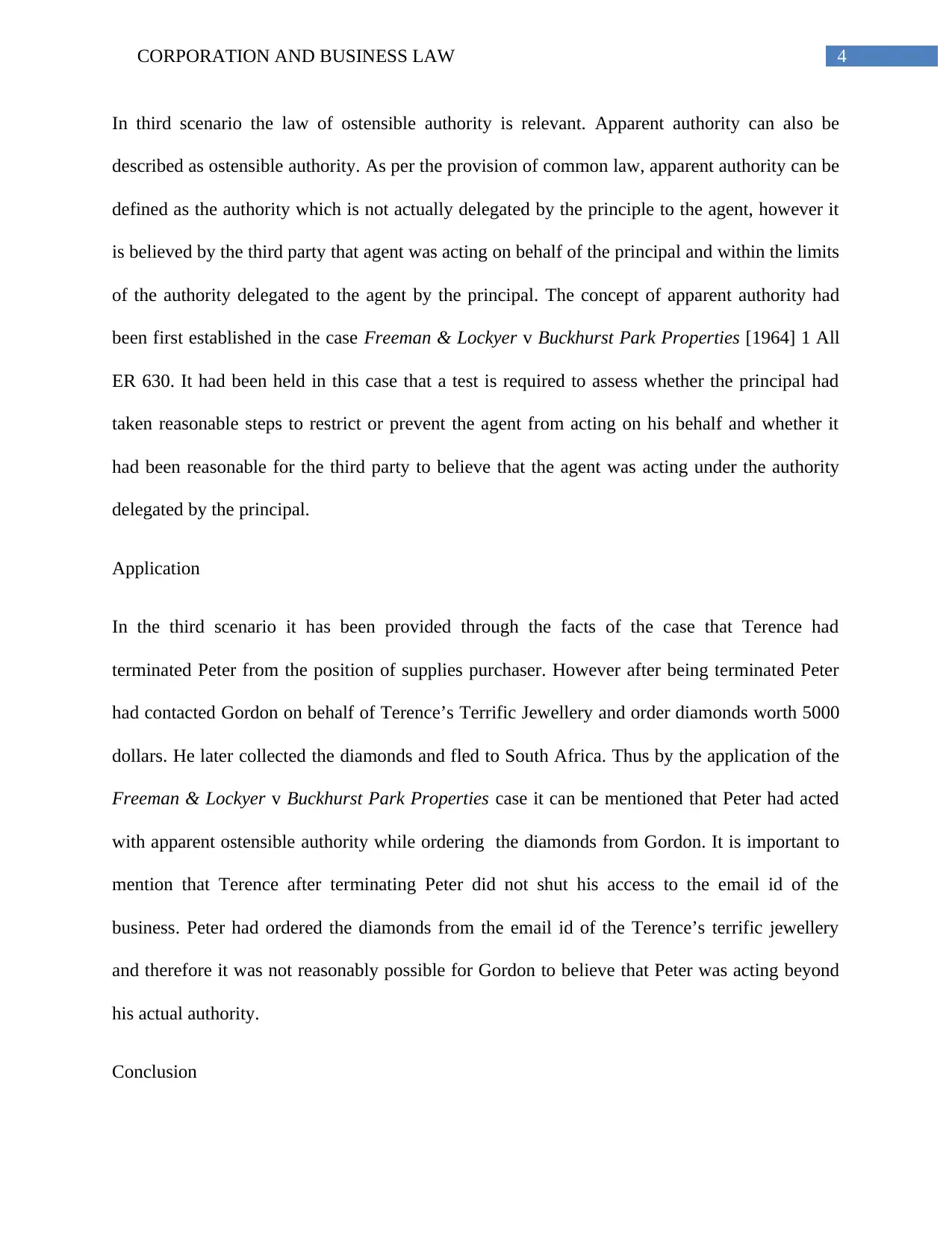
4CORPORATION AND BUSINESS LAW
In third scenario the law of ostensible authority is relevant. Apparent authority can also be
described as ostensible authority. As per the provision of common law, apparent authority can be
defined as the authority which is not actually delegated by the principle to the agent, however it
is believed by the third party that agent was acting on behalf of the principal and within the limits
of the authority delegated to the agent by the principal. The concept of apparent authority had
been first established in the case Freeman & Lockyer v Buckhurst Park Properties [1964] 1 All
ER 630. It had been held in this case that a test is required to assess whether the principal had
taken reasonable steps to restrict or prevent the agent from acting on his behalf and whether it
had been reasonable for the third party to believe that the agent was acting under the authority
delegated by the principal.
Application
In the third scenario it has been provided through the facts of the case that Terence had
terminated Peter from the position of supplies purchaser. However after being terminated Peter
had contacted Gordon on behalf of Terence’s Terrific Jewellery and order diamonds worth 5000
dollars. He later collected the diamonds and fled to South Africa. Thus by the application of the
Freeman & Lockyer v Buckhurst Park Properties case it can be mentioned that Peter had acted
with apparent ostensible authority while ordering the diamonds from Gordon. It is important to
mention that Terence after terminating Peter did not shut his access to the email id of the
business. Peter had ordered the diamonds from the email id of the Terence’s terrific jewellery
and therefore it was not reasonably possible for Gordon to believe that Peter was acting beyond
his actual authority.
Conclusion
In third scenario the law of ostensible authority is relevant. Apparent authority can also be
described as ostensible authority. As per the provision of common law, apparent authority can be
defined as the authority which is not actually delegated by the principle to the agent, however it
is believed by the third party that agent was acting on behalf of the principal and within the limits
of the authority delegated to the agent by the principal. The concept of apparent authority had
been first established in the case Freeman & Lockyer v Buckhurst Park Properties [1964] 1 All
ER 630. It had been held in this case that a test is required to assess whether the principal had
taken reasonable steps to restrict or prevent the agent from acting on his behalf and whether it
had been reasonable for the third party to believe that the agent was acting under the authority
delegated by the principal.
Application
In the third scenario it has been provided through the facts of the case that Terence had
terminated Peter from the position of supplies purchaser. However after being terminated Peter
had contacted Gordon on behalf of Terence’s Terrific Jewellery and order diamonds worth 5000
dollars. He later collected the diamonds and fled to South Africa. Thus by the application of the
Freeman & Lockyer v Buckhurst Park Properties case it can be mentioned that Peter had acted
with apparent ostensible authority while ordering the diamonds from Gordon. It is important to
mention that Terence after terminating Peter did not shut his access to the email id of the
business. Peter had ordered the diamonds from the email id of the Terence’s terrific jewellery
and therefore it was not reasonably possible for Gordon to believe that Peter was acting beyond
his actual authority.
Conclusion
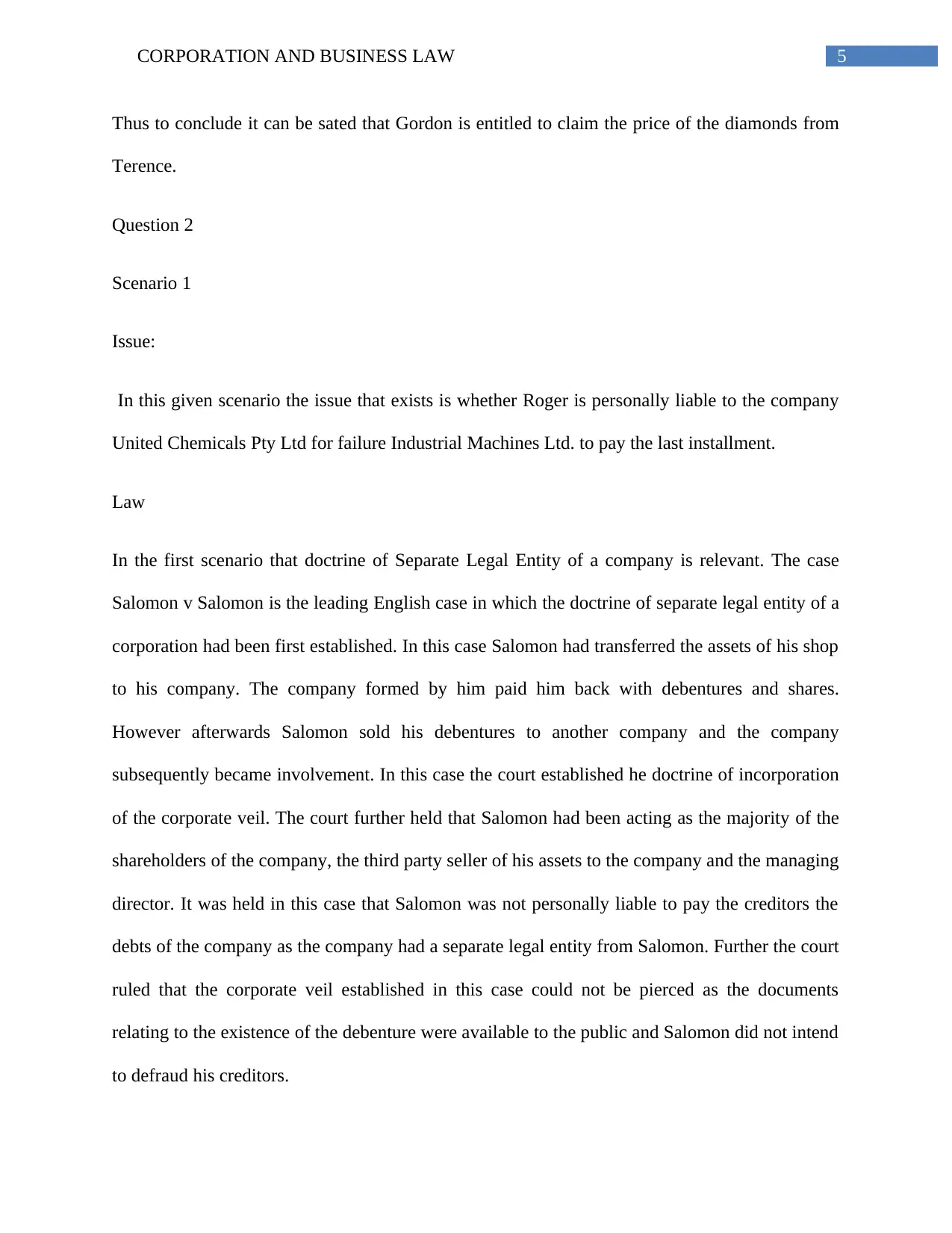
5CORPORATION AND BUSINESS LAW
Thus to conclude it can be sated that Gordon is entitled to claim the price of the diamonds from
Terence.
Question 2
Scenario 1
Issue:
In this given scenario the issue that exists is whether Roger is personally liable to the company
United Chemicals Pty Ltd for failure Industrial Machines Ltd. to pay the last installment.
Law
In the first scenario that doctrine of Separate Legal Entity of a company is relevant. The case
Salomon v Salomon is the leading English case in which the doctrine of separate legal entity of a
corporation had been first established. In this case Salomon had transferred the assets of his shop
to his company. The company formed by him paid him back with debentures and shares.
However afterwards Salomon sold his debentures to another company and the company
subsequently became involvement. In this case the court established he doctrine of incorporation
of the corporate veil. The court further held that Salomon had been acting as the majority of the
shareholders of the company, the third party seller of his assets to the company and the managing
director. It was held in this case that Salomon was not personally liable to pay the creditors the
debts of the company as the company had a separate legal entity from Salomon. Further the court
ruled that the corporate veil established in this case could not be pierced as the documents
relating to the existence of the debenture were available to the public and Salomon did not intend
to defraud his creditors.
Thus to conclude it can be sated that Gordon is entitled to claim the price of the diamonds from
Terence.
Question 2
Scenario 1
Issue:
In this given scenario the issue that exists is whether Roger is personally liable to the company
United Chemicals Pty Ltd for failure Industrial Machines Ltd. to pay the last installment.
Law
In the first scenario that doctrine of Separate Legal Entity of a company is relevant. The case
Salomon v Salomon is the leading English case in which the doctrine of separate legal entity of a
corporation had been first established. In this case Salomon had transferred the assets of his shop
to his company. The company formed by him paid him back with debentures and shares.
However afterwards Salomon sold his debentures to another company and the company
subsequently became involvement. In this case the court established he doctrine of incorporation
of the corporate veil. The court further held that Salomon had been acting as the majority of the
shareholders of the company, the third party seller of his assets to the company and the managing
director. It was held in this case that Salomon was not personally liable to pay the creditors the
debts of the company as the company had a separate legal entity from Salomon. Further the court
ruled that the corporate veil established in this case could not be pierced as the documents
relating to the existence of the debenture were available to the public and Salomon did not intend
to defraud his creditors.
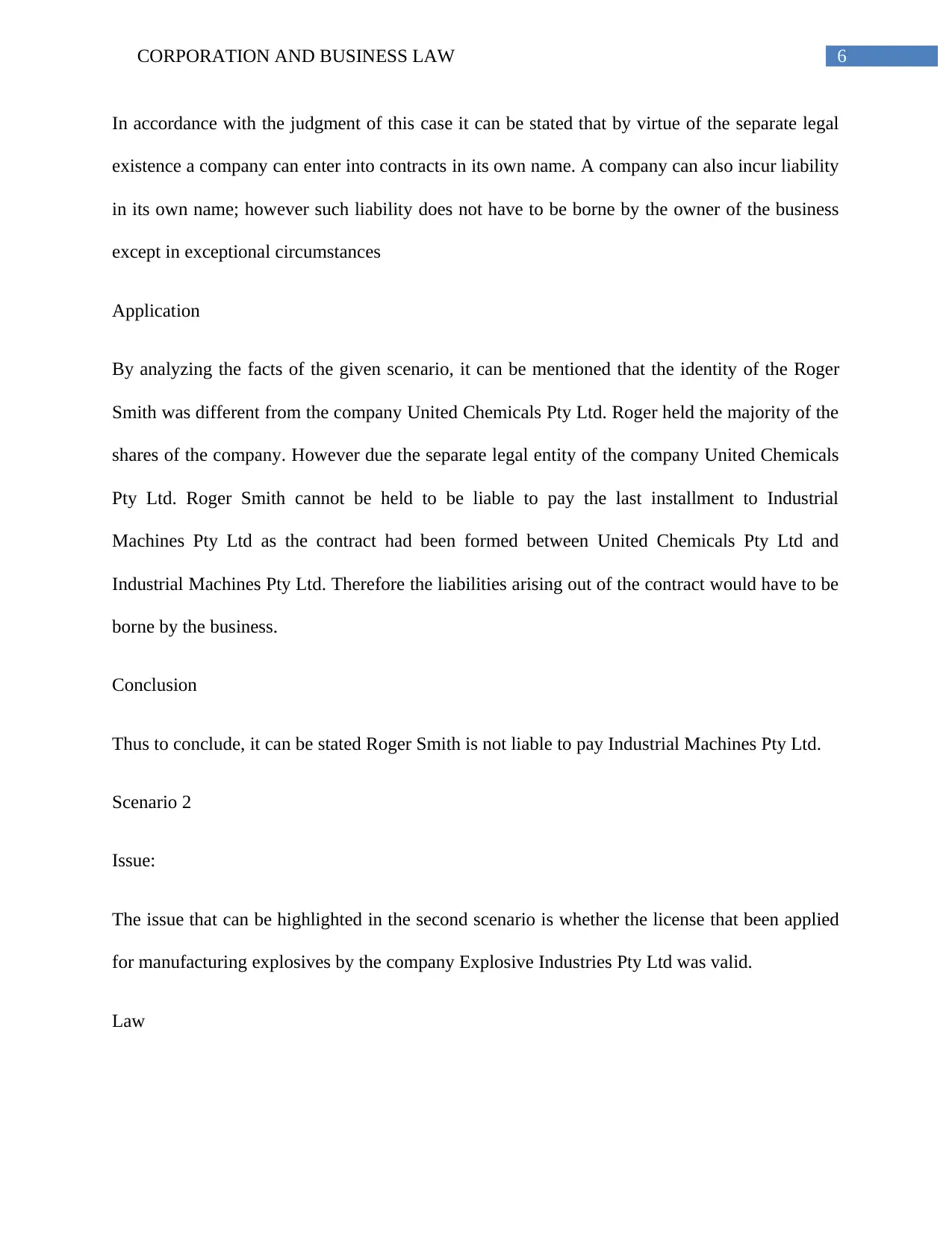
6CORPORATION AND BUSINESS LAW
In accordance with the judgment of this case it can be stated that by virtue of the separate legal
existence a company can enter into contracts in its own name. A company can also incur liability
in its own name; however such liability does not have to be borne by the owner of the business
except in exceptional circumstances
Application
By analyzing the facts of the given scenario, it can be mentioned that the identity of the Roger
Smith was different from the company United Chemicals Pty Ltd. Roger held the majority of the
shares of the company. However due the separate legal entity of the company United Chemicals
Pty Ltd. Roger Smith cannot be held to be liable to pay the last installment to Industrial
Machines Pty Ltd as the contract had been formed between United Chemicals Pty Ltd and
Industrial Machines Pty Ltd. Therefore the liabilities arising out of the contract would have to be
borne by the business.
Conclusion
Thus to conclude, it can be stated Roger Smith is not liable to pay Industrial Machines Pty Ltd.
Scenario 2
Issue:
The issue that can be highlighted in the second scenario is whether the license that been applied
for manufacturing explosives by the company Explosive Industries Pty Ltd was valid.
Law
In accordance with the judgment of this case it can be stated that by virtue of the separate legal
existence a company can enter into contracts in its own name. A company can also incur liability
in its own name; however such liability does not have to be borne by the owner of the business
except in exceptional circumstances
Application
By analyzing the facts of the given scenario, it can be mentioned that the identity of the Roger
Smith was different from the company United Chemicals Pty Ltd. Roger held the majority of the
shares of the company. However due the separate legal entity of the company United Chemicals
Pty Ltd. Roger Smith cannot be held to be liable to pay the last installment to Industrial
Machines Pty Ltd as the contract had been formed between United Chemicals Pty Ltd and
Industrial Machines Pty Ltd. Therefore the liabilities arising out of the contract would have to be
borne by the business.
Conclusion
Thus to conclude, it can be stated Roger Smith is not liable to pay Industrial Machines Pty Ltd.
Scenario 2
Issue:
The issue that can be highlighted in the second scenario is whether the license that been applied
for manufacturing explosives by the company Explosive Industries Pty Ltd was valid.
Law
Paraphrase This Document
Need a fresh take? Get an instant paraphrase of this document with our AI Paraphraser
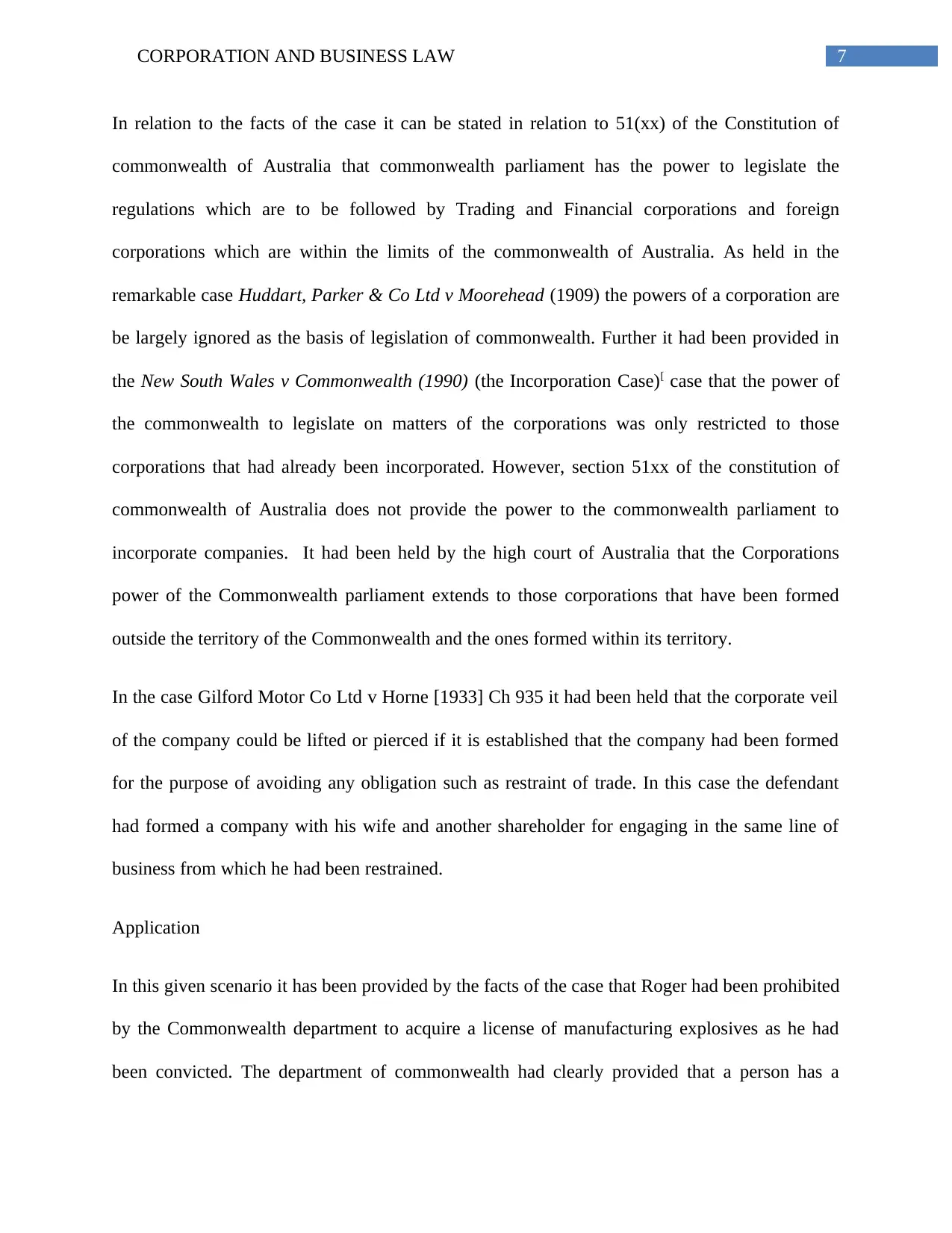
7CORPORATION AND BUSINESS LAW
In relation to the facts of the case it can be stated in relation to 51(xx) of the Constitution of
commonwealth of Australia that commonwealth parliament has the power to legislate the
regulations which are to be followed by Trading and Financial corporations and foreign
corporations which are within the limits of the commonwealth of Australia. As held in the
remarkable case Huddart, Parker & Co Ltd v Moorehead (1909) the powers of a corporation are
be largely ignored as the basis of legislation of commonwealth. Further it had been provided in
the New South Wales v Commonwealth (1990) (the Incorporation Case)[ case that the power of
the commonwealth to legislate on matters of the corporations was only restricted to those
corporations that had already been incorporated. However, section 51xx of the constitution of
commonwealth of Australia does not provide the power to the commonwealth parliament to
incorporate companies. It had been held by the high court of Australia that the Corporations
power of the Commonwealth parliament extends to those corporations that have been formed
outside the territory of the Commonwealth and the ones formed within its territory.
In the case Gilford Motor Co Ltd v Horne [1933] Ch 935 it had been held that the corporate veil
of the company could be lifted or pierced if it is established that the company had been formed
for the purpose of avoiding any obligation such as restraint of trade. In this case the defendant
had formed a company with his wife and another shareholder for engaging in the same line of
business from which he had been restrained.
Application
In this given scenario it has been provided by the facts of the case that Roger had been prohibited
by the Commonwealth department to acquire a license of manufacturing explosives as he had
been convicted. The department of commonwealth had clearly provided that a person has a
In relation to the facts of the case it can be stated in relation to 51(xx) of the Constitution of
commonwealth of Australia that commonwealth parliament has the power to legislate the
regulations which are to be followed by Trading and Financial corporations and foreign
corporations which are within the limits of the commonwealth of Australia. As held in the
remarkable case Huddart, Parker & Co Ltd v Moorehead (1909) the powers of a corporation are
be largely ignored as the basis of legislation of commonwealth. Further it had been provided in
the New South Wales v Commonwealth (1990) (the Incorporation Case)[ case that the power of
the commonwealth to legislate on matters of the corporations was only restricted to those
corporations that had already been incorporated. However, section 51xx of the constitution of
commonwealth of Australia does not provide the power to the commonwealth parliament to
incorporate companies. It had been held by the high court of Australia that the Corporations
power of the Commonwealth parliament extends to those corporations that have been formed
outside the territory of the Commonwealth and the ones formed within its territory.
In the case Gilford Motor Co Ltd v Horne [1933] Ch 935 it had been held that the corporate veil
of the company could be lifted or pierced if it is established that the company had been formed
for the purpose of avoiding any obligation such as restraint of trade. In this case the defendant
had formed a company with his wife and another shareholder for engaging in the same line of
business from which he had been restrained.
Application
In this given scenario it has been provided by the facts of the case that Roger had been prohibited
by the Commonwealth department to acquire a license of manufacturing explosives as he had
been convicted. The department of commonwealth had clearly provided that a person has a
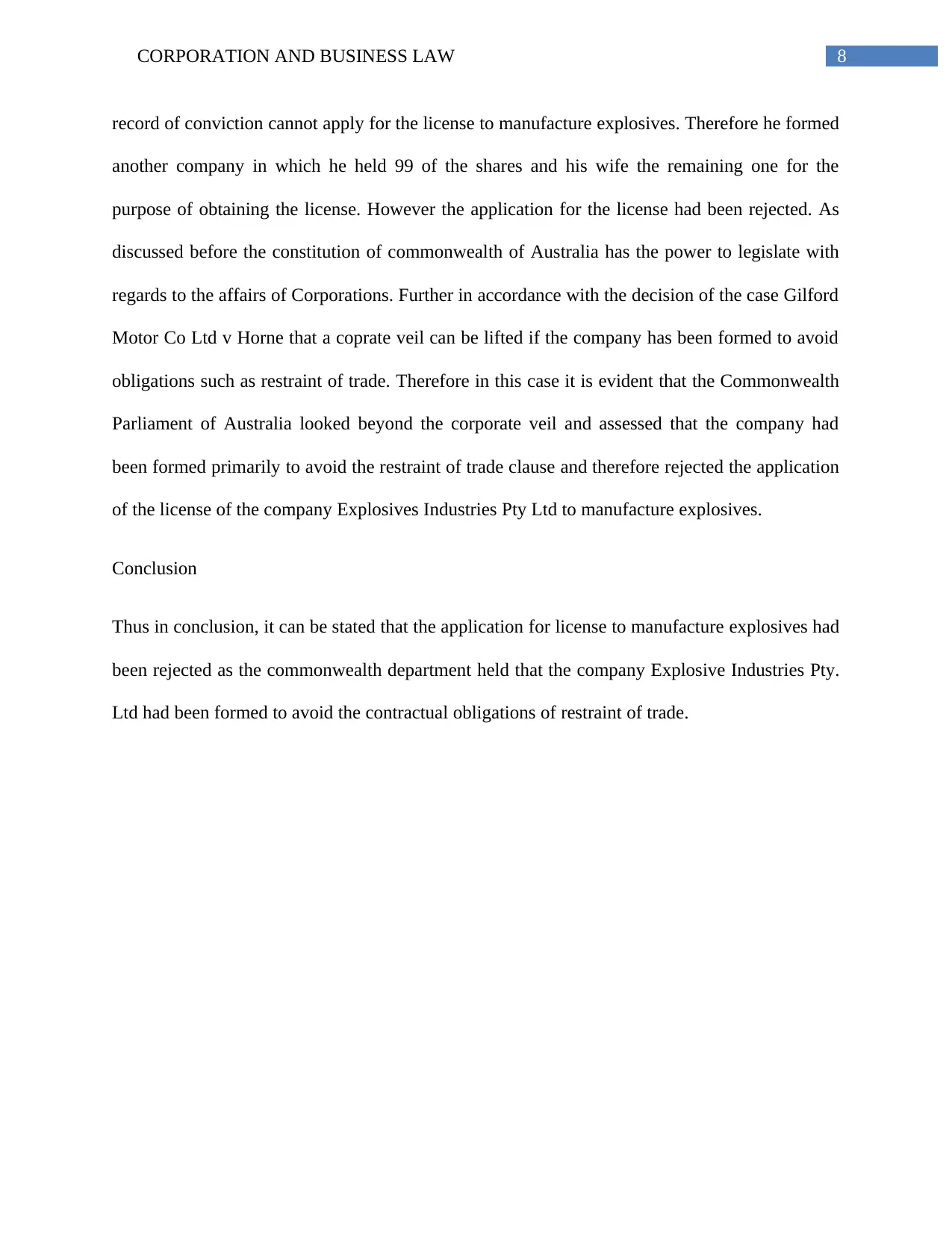
8CORPORATION AND BUSINESS LAW
record of conviction cannot apply for the license to manufacture explosives. Therefore he formed
another company in which he held 99 of the shares and his wife the remaining one for the
purpose of obtaining the license. However the application for the license had been rejected. As
discussed before the constitution of commonwealth of Australia has the power to legislate with
regards to the affairs of Corporations. Further in accordance with the decision of the case Gilford
Motor Co Ltd v Horne that a coprate veil can be lifted if the company has been formed to avoid
obligations such as restraint of trade. Therefore in this case it is evident that the Commonwealth
Parliament of Australia looked beyond the corporate veil and assessed that the company had
been formed primarily to avoid the restraint of trade clause and therefore rejected the application
of the license of the company Explosives Industries Pty Ltd to manufacture explosives.
Conclusion
Thus in conclusion, it can be stated that the application for license to manufacture explosives had
been rejected as the commonwealth department held that the company Explosive Industries Pty.
Ltd had been formed to avoid the contractual obligations of restraint of trade.
record of conviction cannot apply for the license to manufacture explosives. Therefore he formed
another company in which he held 99 of the shares and his wife the remaining one for the
purpose of obtaining the license. However the application for the license had been rejected. As
discussed before the constitution of commonwealth of Australia has the power to legislate with
regards to the affairs of Corporations. Further in accordance with the decision of the case Gilford
Motor Co Ltd v Horne that a coprate veil can be lifted if the company has been formed to avoid
obligations such as restraint of trade. Therefore in this case it is evident that the Commonwealth
Parliament of Australia looked beyond the corporate veil and assessed that the company had
been formed primarily to avoid the restraint of trade clause and therefore rejected the application
of the license of the company Explosives Industries Pty Ltd to manufacture explosives.
Conclusion
Thus in conclusion, it can be stated that the application for license to manufacture explosives had
been rejected as the commonwealth department held that the company Explosive Industries Pty.
Ltd had been formed to avoid the contractual obligations of restraint of trade.
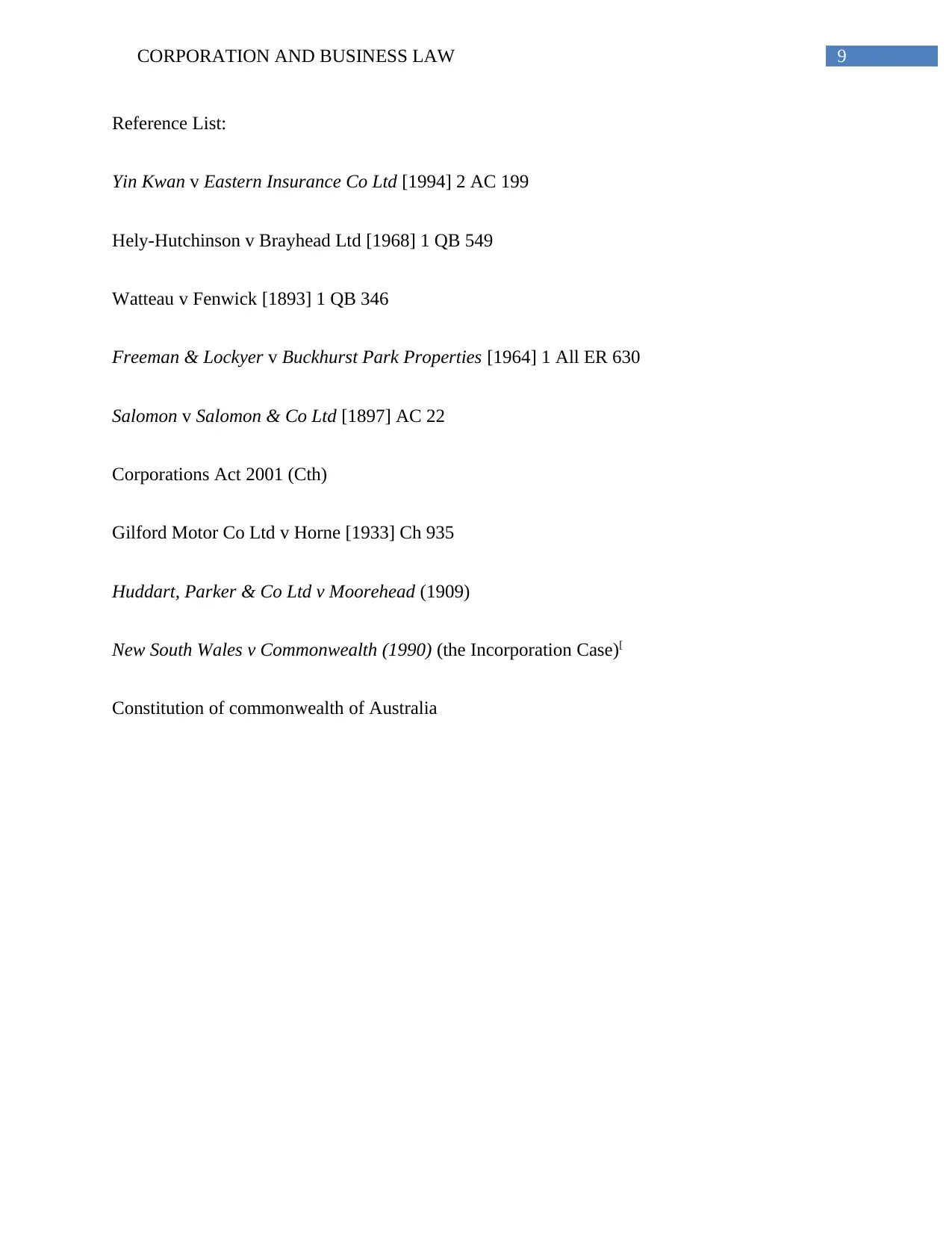
9CORPORATION AND BUSINESS LAW
Reference List:
Yin Kwan v Eastern Insurance Co Ltd [1994] 2 AC 199
Hely-Hutchinson v Brayhead Ltd [1968] 1 QB 549
Watteau v Fenwick [1893] 1 QB 346
Freeman & Lockyer v Buckhurst Park Properties [1964] 1 All ER 630
Salomon v Salomon & Co Ltd [1897] AC 22
Corporations Act 2001 (Cth)
Gilford Motor Co Ltd v Horne [1933] Ch 935
Huddart, Parker & Co Ltd v Moorehead (1909)
New South Wales v Commonwealth (1990) (the Incorporation Case)[
Constitution of commonwealth of Australia
Reference List:
Yin Kwan v Eastern Insurance Co Ltd [1994] 2 AC 199
Hely-Hutchinson v Brayhead Ltd [1968] 1 QB 549
Watteau v Fenwick [1893] 1 QB 346
Freeman & Lockyer v Buckhurst Park Properties [1964] 1 All ER 630
Salomon v Salomon & Co Ltd [1897] AC 22
Corporations Act 2001 (Cth)
Gilford Motor Co Ltd v Horne [1933] Ch 935
Huddart, Parker & Co Ltd v Moorehead (1909)
New South Wales v Commonwealth (1990) (the Incorporation Case)[
Constitution of commonwealth of Australia
1 out of 10
Related Documents
Your All-in-One AI-Powered Toolkit for Academic Success.
+13062052269
info@desklib.com
Available 24*7 on WhatsApp / Email
![[object Object]](/_next/static/media/star-bottom.7253800d.svg)
Unlock your academic potential
© 2024 | Zucol Services PVT LTD | All rights reserved.



